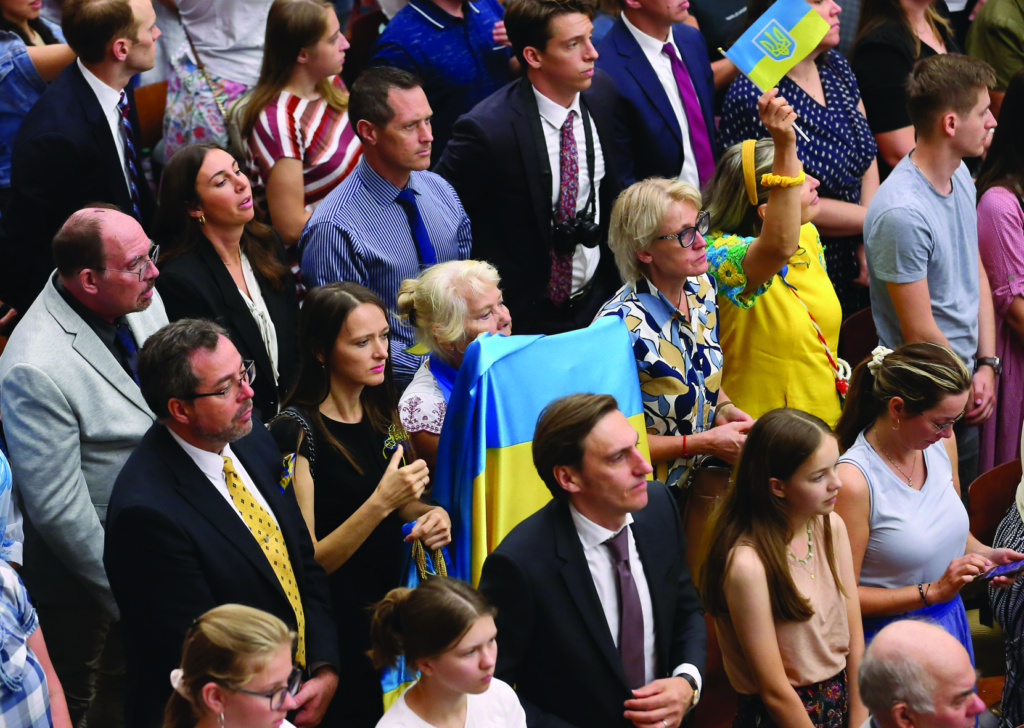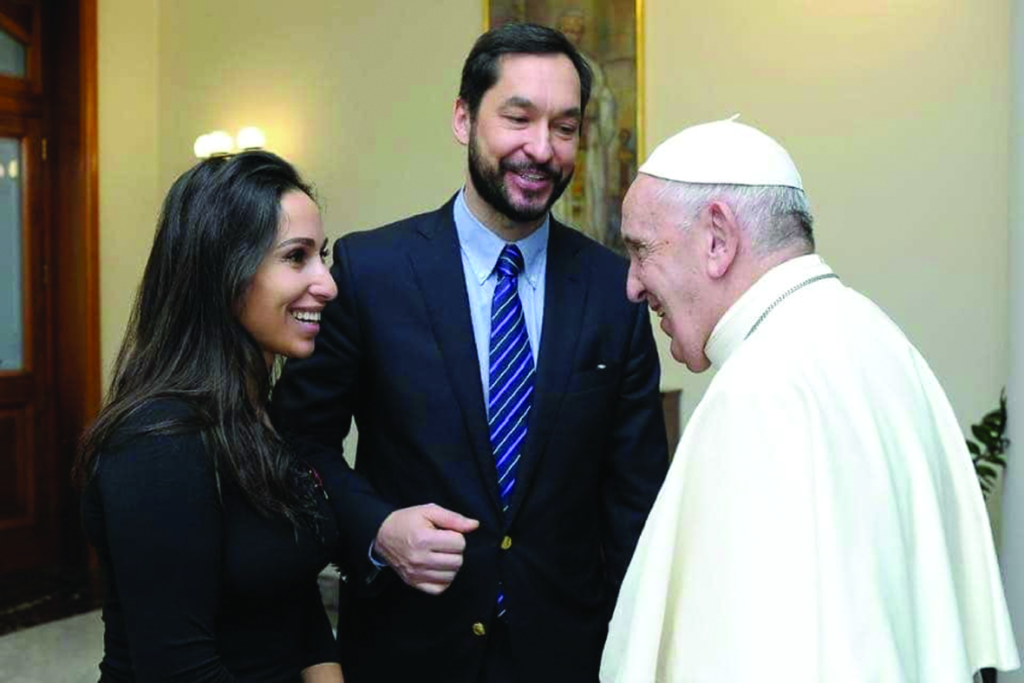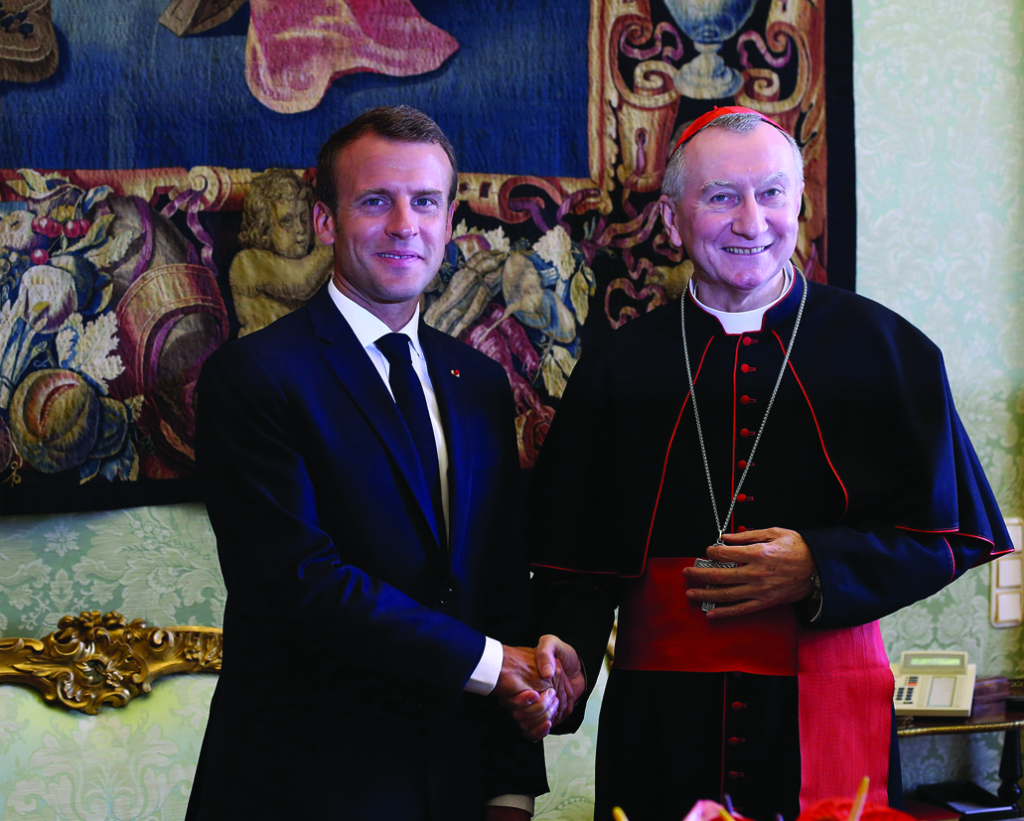Possible behind-the-scenes negotiators for Ukraine-Russia peace talks
By Robert Moynihan

August 24, 2022, Vatican City. Pope Francis leads the general audience at Paul VI Audience Hall. Present is Ukraine’s Ambassador to the Holy See Andrii Yurash (photo Grzegorz Galazka).
On December 8, Pope Francis shed tears publicly over the tragedy of the war in Ukraine, calling the war “a defeat for humanity.”
He was in Piazza di Spagna, in front of a column capped by a statue of the Blessed Virgin Mary, on a traditional December 8 visit to the piazza for the Feast of the Immaculate Conception.
Francis, among all world leaders (I dare to say… willing to accept criticism if it comes) has been the one who has most insisted that the war should be brought to an end by peace talks.
And he deserves our respect and appreciation for this, I believe.
This lonely, much-criticized effort of Francis needs to be acknowledged: that Francis, among the world’s leaders, has been the one most focused on ending the killing. May God reward him for this.
An Unofficial Vatican-Russia “Liaison

In a private audience, Pope Francis meets Leonid Sevastianov, one of the prominent members of the 1-2 million member “Old Believer” community of Russia, with his wife, Svetlana
Four days later, on December 12, an intriguing article was published on the news website Intelligenceonline.com suggesting the names of a number of possible “behind the scenes” negotiators for potential Ukraine-Russia peace talks.
One of those figures is Leonid Sevastianov, 44, who represents himself as the head of the 1-2 million member “Old Believers” community of Russia (previously headed by his father). The article suggests that Sevastianov is a “liaison” between… Pope Francis and the Kremlin leadership. How could this possibly be?
Sevastianov worked as a consultant for the Russian atomic energy company Rosatom, whose head was a man named Sergei Kirienko, who is close to Russian President Putin.
The article notes that there is some opposition, or irritation, in Catholic Church circles, with regard to “Old Believer” Sevastianov’s alleged “liaison” role with the Pope. It states:
“In Paris, the Pope liaises with his ambassador, Apostolic Nuncio Celestino Migliore [Note: Migliore, 70, was nuncio in Russia from 2016 to 2020, under Pope Francis, so Migliore does know Russia well.—RM]. In private, Migliore protests about the leading role Sevastianov plays in Moscow. The Old Believer is not a nuncio, but an ad hoc spokesman by virtue of his close personal relations with the Pope, who consequently entrusted him with this unofficial mission.”
Friendship with Pope Francis
I met Sevastianov in 2001, when he came to Rome to study at the Gregorian University. I then worked with him on many projects, especially preparing the concerts of Metropolitan Hilarion in Rome, Washington, New York, and at Harvard in Cambridge, Massachusetts, in 2007.
And, with Sevastianov, our Urbi et Orbi group helped organize a “Concert for Peace” in Rome on November 12, 2013, featuring Svetlana Kasyan, a Russian opera soprano, who is Sevastianov’s wife.
It was at that time — November 2013 — that Sevastianov and his wife were first invited to stay at the Domus Santa Marta, where Pope Francis lives, and so were able in 2013 to meet Pope Francis in person for the first time. From that meeting, a friendship has grown over the past nine years…
Macron and the Vatican
According to Intelligence Online, “Pope Francis has made it known to his close advisers that he would like to see the French president invite Vladimir Putin to the Vatican for negotiations on what is hoped to be perceived as a neutral footing.”
However, reported the website, Kremlin spokesman Dmitry Peskov on November 28 said that Russia was not ready to accept negotiations, including at the Vatican, “under current conditions.”
“The president’s office, however, is poring over different scenarios under which talks at the Vatican could take place, taking into account the military balance of power on the ground and the fallout from sanctions.
After the Pope’s idea to encourage Macron to invite the warring parties to the Holy See reached Russia’s presidential administration, Putin’s foreign policy adviser Yuri Ushakov (IO, 20/04/22) made a comment at the press conference on December 6 which did not go unnoticed: according to him, the French president “talks a lot about maintaining contacts, dialogue with Putin, but does not take any concrete steps in this direction.”
There is no certainty that any of these channels, or efforts, can or will bring about peace talks to end the war in Ukraine.
However, we may continue to pray for the blessing of peace in the new year, hoping that this may be a time when our thoughts turn toward Almighty God, and toward the Blessed Mother, and that, once having turned toward them, they may assist us to accomplish things not possible for merely human strength.
Cardinal Parolin: “Revive the spirit of Helsinki”

In the face of the war in Ukraine, “we cannot but ask ourselves whether we are doing everything, everything possible to put an end to this tragedy,” said Cardinal Pietro Parolin, Secretary of State at the Vatican, at an event at the Italian Embassy to the Holy See on December 13. The cardinal stressed that “war itself is an error and an abomination,” repeating Pope Francis’ call to “use all diplomatic instruments, including those that have not been used to date, to achieve a ceasefire and a just peace reach.”
The cardinal secretary of state added: “In the last few weeks we have seen a glimmer of hope for a possible resumption of negotiations, but also lockdowns and the escalation of bombing” and “it is terrifying that we have returned to talk about the use of nuclear devices and atomic warfare as a possible eventuality. It is worrying that in several countries around the world, the race to rearmament has accelerated, with huge sums being spent on fighting hunger, creating jobs and ensuring adequate medical care for millions of people could be used.”
Referring to the theme of the event, Cardinal Parolin called for “reviving the spirit of Helsinki and working creatively” and called for “new tools” to tackle not only the war in Ukraine but also the many forgotten wars. “We cannot envision the future based on old patterns, old military alliances, or ideological and economic colonization. We must envision and build a new concept of peace and international solidarity.” “We need courage, to bet on peace and not on the inevitability of war.”
“Why not go back and reread the outcome of the Helsinki conference to take some of its fruits and put them on the table in a new form? Why not work together to have a new major European peace conference?” asked the cardinal, and wished for “a stronger organized and prepared participation of European civil society, peace movements, think tanks and organizations working at all levels for peace education and dialogue.” (Agenzia Fides).






Facebook Comments